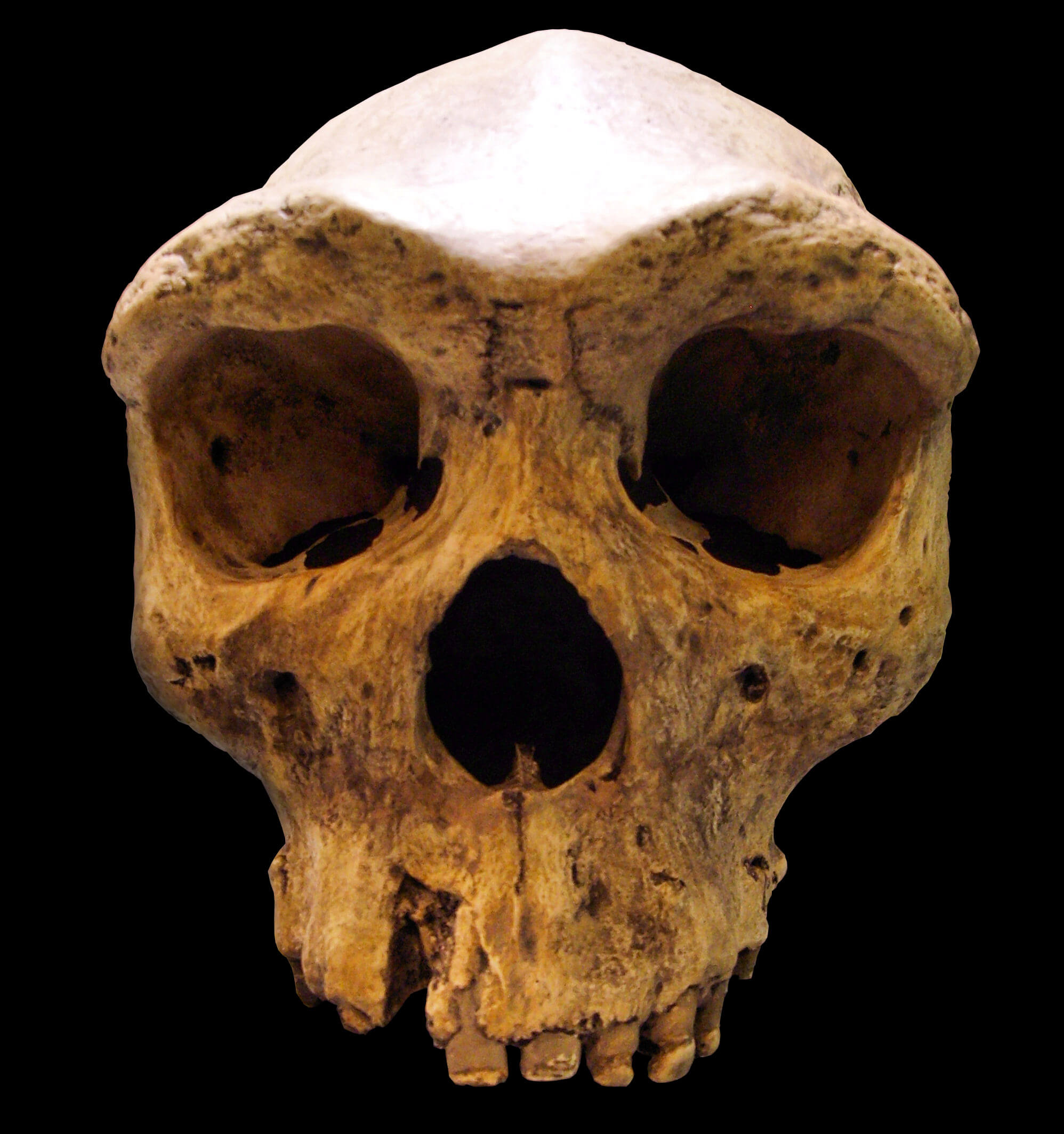
(Picture from here.)
There have been a number of exciting human evolution discoveries in the past year. I'm going to highlight a few and speculate a whole bunch.
The current model has hominids evolving in Africa. Archaic forms of modern humans appeared about 200-400,000 years ago. Neanderthals split off the main trunk a bit earlier, about 350-600,000 years ago. By 130k years ago Neanderthals were pretty well defined. Anatomically humans were in place 200k years ago and behaviorally modern humans were in lace about 50k (or 40k, or 70k, or 80k,. All of these numbers are approximate and vary depending on who you read) years ago. You can look all this up in Wikipedia here. But move fast as wiki-space tends to change as the science changes.
Neanderthal has been portrayed as being unfit for competition with humans for a few reasons. He ate exclusively meat. He wasn't able to adapt to the climate change. He wasn't that smart. All of these may be false. He ate more than just meat-- he's been shown to eat fish and vegetables. (See here.) He was an innovator and changed his toolkit according to his needs. (See here.) While there is good evidence that humans took longer to mature (see here) it's not clear to me that this was an advantage at the time against Neanderthals. Though it would be a clear advantage now. It looks that this trait of humans being late bloomers was fixed at about 160k years ago and strong overlaps the period that humans and Neanderthals coexisted. Hence, my skepticism that it was a factor in the Neanderthal/Homo sapiens conflict.
Humans are hard on their environment. My own bet is that the Neanderthals couldn't cope in the ecological catastrophe that humans created and had to keep moving to find new lands. Eventually, they ran out of places to go.
There's also evidence from last fall (see here) that modern humans emerged from Africa earlier than thought. Fossil evidence in Zhiren Cave in south China is at least 100,000 years old. Quite a bit older than the previous date of China about 60,000 years ago. These anatomically modern humans did not show the cultural and technical innovations we associate with modern humans. They were not behaviorally modern. It also shows that archaic human and modern human forms coexisted for quite a while.
Add into this the Siberian Christmas Finger Bone. (See here.) This was a finger bone of a young girl found in southern Siberia that was neither early modern human nor Neanderthal. DNA extracted from the bone has suggested that she belonged to an extinct branch of the family tree dubbed "Denisovans" after the cave where the remains were discovered.
The Denisovans were a sister group of Neanderthals and bear a resemblance to older human ancestors such as Homo habilis and Homo erectus. (One wonders about the relationships between the Denisovans and Homo floresiensis.)
What makes it even more interesting is there some of the genes found in the Denisovans are also found in modern Melanesians. Since the Denisovans split off from humans before modern humans existed this suggests there was interbreeding between the two lineages. Remember also the evidence of interbreeding between Neanderthals and some European populations.
But if anatomically modern humans came out of Africa about 200k years ago, what the heck are they doing in Israel 200k years earlier. (See here.)
Qesem Cave is located near Rosh Ha'ayin. It was first excavated in 2000. Recently, a complex analysis of human teeth was completed. The size and shape of the teeth were very similar to modern humans dated in Israel to about 100k years ago. But the site is dated to a period of 200k to 400k years ago. Did they just happen to show up in Israel first?
Possibly. Or modern humans are older than we thought.
The human family tree is getting very, very complex.
So, whence come we?
What is first clear is that the appearance of anatomically modern humans and behaviorally modern humans are not the same thing at all. There's been a lot of discussion about what caused the change. The invention of language? New ways of getting foodstuff? Learning how to be unrelenting and ruthless a-holes?
I suspect it's more subtle. I also suspect it is not a biological mechanism-- or it is a cultural response to a biological mechanism. Mainly, I think this because biological mechanisms take time to occur. It takes time for humans to stand upright, evolve a shoulder, develop hands and feet, etc. I see no reason to believe that the physical structures in the brain somehow take less time to evolve. The brain is hard to parse and I think the idea of its physical nature being that plastic results more from our ignorance of how things work in there rather than anything else.
No, I think about 50k (or 40k, or 70k, or 80k) years ago a population of humans struck on an idea.
I don't know what the idea was. Maybe it was monogamous pair bonding. Maybe it was religion. Maybe it was song. (Bruce Chatwin's idea.) But it was something fundamental and powerful that had not been considered before.
Maybe it was just the concept that, hey, we can use this thing that we built to hunt gazelle as a fishing line. Or weaving tool. Or a musical instrument. Or, maybe, anything a human being creates, be it concept, relationship, song or tool, has the possibility of being used for something other than what it was built for.
And thus abstract modeling, along with humanity, was born.



I like that idea. Abstract thought creating a leap in evolution.... interesting to project that forward with the concept of the internet being the catalyst for something similar... wish I could be around in a few thousand (million) years to see how it turns out!
ReplyDeleteAlso gives me an idea for a story!